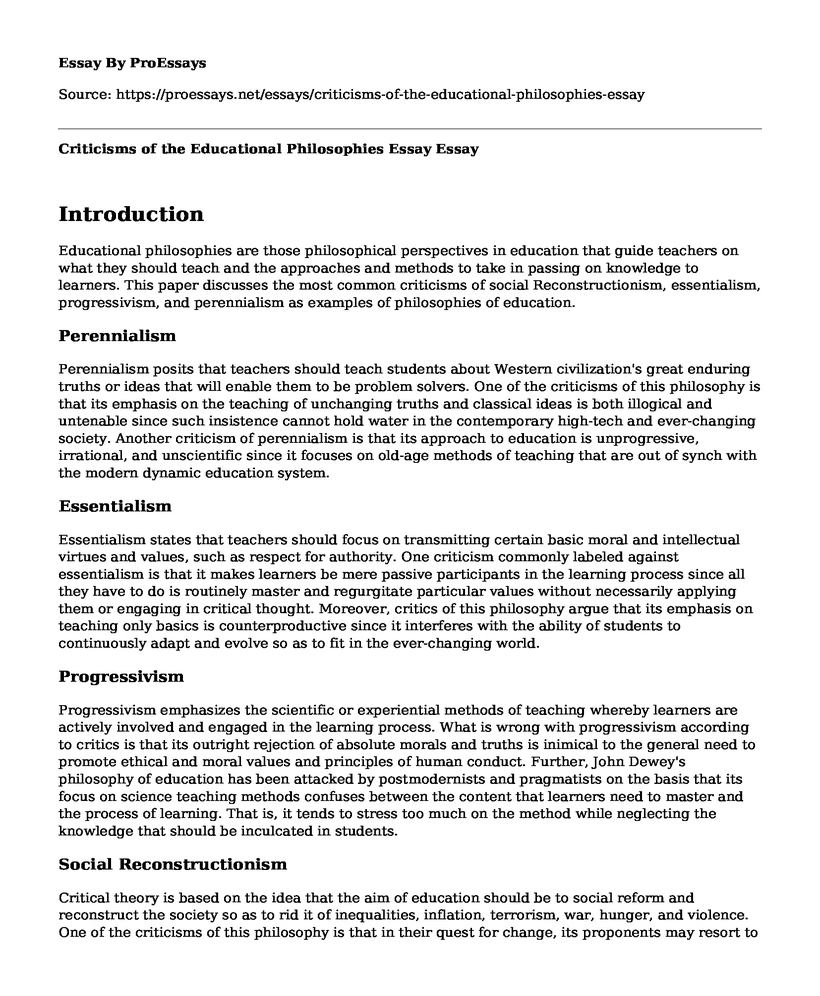Introduction
Educational philosophies are those philosophical perspectives in education that guide teachers on what they should teach and the approaches and methods to take in passing on knowledge to learners. This paper discusses the most common criticisms of social Reconstructionism, essentialism, progressivism, and perennialism as examples of philosophies of education.
Perennialism
Perennialism posits that teachers should teach students about Western civilization's great enduring truths or ideas that will enable them to be problem solvers. One of the criticisms of this philosophy is that its emphasis on the teaching of unchanging truths and classical ideas is both illogical and untenable since such insistence cannot hold water in the contemporary high-tech and ever-changing society. Another criticism of perennialism is that its approach to education is unprogressive, irrational, and unscientific since it focuses on old-age methods of teaching that are out of synch with the modern dynamic education system.
Essentialism
Essentialism states that teachers should focus on transmitting certain basic moral and intellectual virtues and values, such as respect for authority. One criticism commonly labeled against essentialism is that it makes learners be mere passive participants in the learning process since all they have to do is routinely master and regurgitate particular values without necessarily applying them or engaging in critical thought. Moreover, critics of this philosophy argue that its emphasis on teaching only basics is counterproductive since it interferes with the ability of students to continuously adapt and evolve so as to fit in the ever-changing world.
Progressivism
Progressivism emphasizes the scientific or experiential methods of teaching whereby learners are actively involved and engaged in the learning process. What is wrong with progressivism according to critics is that its outright rejection of absolute morals and truths is inimical to the general need to promote ethical and moral values and principles of human conduct. Further, John Dewey's philosophy of education has been attacked by postmodernists and pragmatists on the basis that its focus on science teaching methods confuses between the content that learners need to master and the process of learning. That is, it tends to stress too much on the method while neglecting the knowledge that should be inculcated in students.
Social Reconstructionism
Critical theory is based on the idea that the aim of education should be to social reform and reconstruct the society so as to rid it of inequalities, inflation, terrorism, war, hunger, and violence. One of the criticisms of this philosophy is that in their quest for change, its proponents may resort to precipitous and questionable techniques that may harm the society in the long term. Additionally, critics maintain that some of the ideas of education suggested by social re-constructionists are utopian in character as they cannot be realized only through learning.
Conclusion
To summarize, though the philosophies of education provide teachers with important insights on how to transmit knowledge to learners, they suffer from various flaws. Therefore, it is imperative that instructors understand these criticisms so as to be able to engage in critical teaching.
Cite this page
Criticisms of the Educational Philosophies Essay. (2022, Aug 10). Retrieved from https://proessays.net/essays/criticisms-of-the-educational-philosophies-essay
If you are the original author of this essay and no longer wish to have it published on the ProEssays website, please click below to request its removal:
- Quantitative Methods
- Paper Example on Nuclear Weapons Should be Eliminated
- Notions of Human Nature Essay
- Nutritional Requirement of Children Paper Example
- Role of Play in Growth and Development of Preschoolers Essay
- Essay Sample on Child Development: Psychological and Social Influences
- Paper Example on Contingency Theory: Criticisms and Challenges







